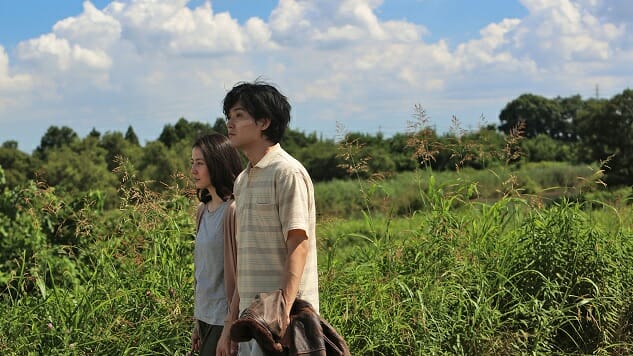Kiyoshi Kurosawa is either a genius or a wackadoodle. In his new movie, Before We Vanish, a trio of alien invaders land on Earth, possess a human host apiece and set about readying the planet for both their species’ arrival and our subsequent extinction. Kurosawa’s basic conceit establishes an identity crisis narrative, and by happy accident that’s exactly what the film goes through: a struggle between two completely different storytelling modes. In the first, Kurosawa stages a melancholic domestic love story. In the second, he plays around with formulaic genre elements. Neither of these threads tie together well—if they tie together at all.
Balancing two completely different genres in one movie without tipping the scales disproportionately in favor of one, at the expense of the other, can be done: The World’s End pulls it off; District 9 pulls it off. Perhaps most apropos of all, Jang Joon-hwan’s superb and tragically underloved Save the Green Planet! pulls it off with a similar premise. Before We Vanish is almost too much of a stretch for Kurosawa, veering from gory sci-fi horror to screwball comedy to marital drama to alien conspiracy potboiler without the necessary connective tissue to give his genre cocktail equilibrium. One might appreciate his attempts at unhinged absurdity, but one might also wish he’d abandoned absurdity altogether and just made a Kurosawa movie.
The film begins on an inscrutable image—a hand scooping a goldfish out of water with a strainer—and then: Cut to suburban slaughter. A family lies murdered in their home as the apparent daughter, Akira (Yuri Tsunematsu), stands emotionlessly surveying the carnage. She licks blood from her hand, then stumbles into traffic for no discernible reason. As we try to make sense of the sequence, Kurosawa introduces us in turn to our human anchors, Narumi (Masami Nagasawa), a woman stumped by her husband Shinji’s (Ryuhei Matsuda) sudden descent into childlike doltishness, and Sakurai (Hiroki Hasegawa), a journalist assigned to cover the film’s opening bloodbath who walks into a web of alien subterfuge.
We quickly learn that Shinji isn’t Shinji. He’s an extraterrestrial residing in Shinji’s body. The same goes for Akira, and for Amano (Mahiro Takasugi), who designates Sakurai as his “guide,” much as Shinji designates Narumi as his. The aliens’ mission (bear with me here) is to collect “conceptions” from humans: Their ideas about and definitions of work, possession, family and love, among other things. Collection takes on literal meaning. When aliens collect conceptions, the people they take them from lose their grasp on its meaning. Narumi’s hard-nosed boss, for instance, gleefully tears apart his office in a destructive fit of play after bumping into Shinji, and her sister ditches her, as well as her mother and father, for good.
Collection doesn’t turn a human into a husk, it changes that human’s personality for better or worse. Likewise, Before We Vanish is in a constant state of flux. Either of its two halves could work well as individual wholes, Narumi and Shinji’s especially. Maybe it’s unfair to suggest that Kurosawa should stick to what he knows; from Cure to Pulse to Creepy, Kurosawa’s body of work is littered with psychological thrillers and horror flicks angled at our anxiety centers, and god forbid directors try stepping outside their aesthetic boxes. But the tension in Narumi’s mystification at her husband’s inexplicable behavior is straight out of Kurosawa’s playbook, buoyed by blended suspense and tenderness. We’re aware from the outset that Narumi and Shinji have relationship problems, but if the “man learns how to be a better man by becoming an alien” angle is tried and true, it’s also suited to its author’s cinema.
The familiarity of the film’s tone is welcoming. Kurosawa builds Narumi and Shinji’s marriage anew with pauses and long takes, the kind of lingering, haunting beats he normally deploys to foment dread. But Before We Vanish isn’t dreadful. It aches. Nagasawa dramatizes the strain her situation places on Narumi’s shoulders and well-being through baffled sorrow. Matsuda, saddled with a comparably breezy task, wanders around blank-faced, a child experiencing the world for the first time. Their moments together are moments to save. Hasegawa has less to work with, as his scenes have less meat on their bones. Shocking violence and covert government operations make up the bulk of these segments, occasionally overlaid by a bizarre, impish brass instrument score right out of Looney Tunes or Mel Brooks movies. It’s too goofy for mere words.
Worse, it clangs against Before We Vanish’s ultimate goal, dramatically undercutting its framework as art concerned with the course of humanity’s fate. The film suggests we’re close to extinguishing our own race as is. (In that case, stepping aside for an alien takeover seems perfectly reasonable.) Kurosawa tries to contrast arguments both for and against mankind’s annihilation with his dueling plots—Sakurai’s decision to aid and abet Amano and Akira doesn’t cast him or our species in the best light—but the only argument he needs is couched in the pangs of regret and resurging romance in Narumi’s slow reconnection with Shinji. His excesses drag Before We Vanish down, reducing the film to obvious and clichéd ruminations on the nature of man: a complex and moving story wrapped up in genre dissonance.
Director: Kiyoshi Kurosawa
Writer: Kiyoshi Kurosawa, Sachiko Tanaka
Starring: Masami Nagasawa, Hiroki Hasegawa, Ryuhei Matsuda, Mahiro Takasugi, Yuri Tsunematsu, Takashi Sasano
Release Date: February 2, 2018
Boston-based pop culture critic Andy Crump has been writing about film and television online since 2009, and has been contributing to Paste since 2013. He also writes words for The Playlist, WBUR’s The ARTery, Slant Magazine, The Hollywood Reporter, Polygon, Thrillist and Vulture, and is a member of the Online Film Critics Society and the Boston Online Film Critics Association. You can follow him on Twitter and find his collected writing at his personal blog. He is composed of roughly 65% craft beer.
